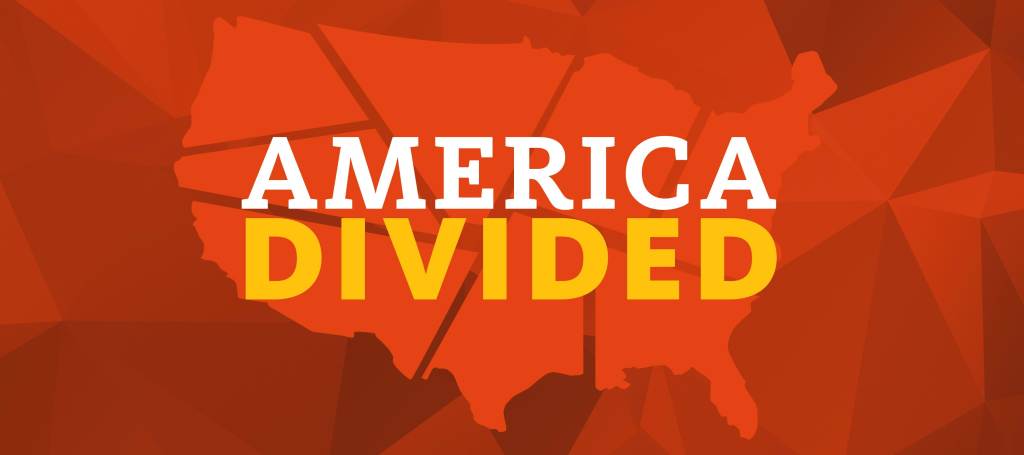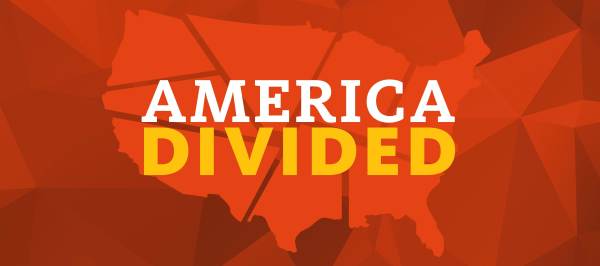
Each week, the Ford Foundation has been recapping the latest episode of America Divided—a docu-series about rising inequality in the United States. You can watch America Divided on Friday nights at 9 pm EST on EPIX and read last week’s episode recap here.
In tonight’s episode, we are introduced to actor and comedian Zach Galifianakis as he uncovers the growing influence of big money in politics. We also revisit two stories from last week’s episode: America Ferrera’s mission to lift up the voices of undocumented immigrants and Peter Sarsgaard’s investigation of the opioid crisis.
The influence of money in politics
In tonight’s episode, Zach Galifianakis travels to North Carolina to investigate the relationship between big money and politics and how it influences government.
Speaking with citizens, community advocates, and academics, Galifianakis learns about how big money in politics can create and exacerbate political inequality, with low-income Americans losing out in the democratic process. A recent study on political influence in the US finds that “the preferences of people in the bottom third of the income distribution have no apparent impact on the behavior of their elected officials.”
Galifianakis uncovers how corporate money in North Carolina state politics is making the government more susceptible to regulatory capture and unresponsive to the basic needs of citizens. For example, North Carolina has the fastest-growing poverty rate in the country. Yet the state government has cut unemployment benefits and funding for food stamps, hurting the 1.7 million people in the state living in poverty.
Instead, elected officials have prioritized reducing corporate taxes and deregulation. Specifically, Galifianakis points to the recent Duke Energy coal ash spill, the third-largest spill of its kind in the country. During the year of the spill, Duke Energy made a $3 million donation to the political organization that helped elect the state governor, and the state ended up fining Duke Energy, a $23 billion company, less than $100,000.
More and more evidence demonstrates that the growing influence of money in politics skews the political agenda, influencing everything from who runs for public office to what topics elected officials prioritize at the expense of others. Our elected officials do not reflect the diversity of our country and oftentimes do not enact policies that reflect the policy preferences of communities of color and working-class people. This in turn contributes to citizen and voter disengagement and undermines the public’s trust and faith in government. Indeed, 84 percent of Americans across party lines believe that money has too great an impact on our political campaigns and 85 percent believe that a fundamental change to our campaign-funding systems is needed.
One way to tackle the problem is by democratizing money in politics to increase the role that small donors and ordinary people play in the process. Money has the possibility of actually bringing new voices into the political process—it can improve the accountability of public officials and give ordinary people a fighting chance. For example, voters in Seattle passed a ballot measure last year that could potentially do just that. Starting in 2017, the government will give each eligible voter in the city four $25 vouchers that they can give to the candidates of their choice. The hope is that the voucher initiative will push political candidates to engage more directly with ordinary voters and shift their attention and time away from catering to corporate and wealthy donors.
Protecting the rights of US-born children of undocumented immigrants
Also in tonight’s episode, we learn about the obstacles states like Texas are enacting to deny birth certificates to American-born children of undocumented immigrants, essentially making these children stateless.
Under the US Constitution, anyone born in this country is considered a US citizen and individual states cannot deny a person that right. However, a couple of years back, Texas started making it extremely difficult for US-born children of undocumented immigrants to be given that right. Texas stopped accepting matrículas—ID cards issued by the Mexican consulate—as formal identification for undocumented parents trying to obtain birth certificates for their American children. Instead, the state started requiring IDs that are difficult for undocumented parents to obtain, such as a driver’s license, voter ID card, or visa.
We follow America Ferrera as she tries to help Sandra, an undocumented Mexican immigrant, get a birth certificate for her newborn at the local registrar’s office. This is the third visit by Sandra to the office and she is once again denied by the registrar, who tells her that the matrícula is not an acceptable form of ID. Birth certificates are critical for children like Sandra’s newborn because they provide proof of their citizenship and are required for them to enroll in public school, travel outside the US, and receive public assistance.
In the absence of federal immigration reform, state and local governments have taken to dealing with the issue of immigration locally. Since 2005, states have passed more than 3,000 immigration-related laws; in the first half of 2016 alone, 41 states enacted 229 of these laws. Some of these measures will serve to welcome immigrants, but many will actively marginalize these communities. In the Texas birth certificate case, a lawsuit ultimately allowed families like Sandra’s to receive the birth certificates to which they were constitutionally entitled.
As in Texas, litigation often is the critical backstop, ensuring that immigrant communities are protected from the most regressive policy proposals. Litigation has also been central to the Ford Foundation’s work in this area. When Arizona passed its notorious anti-immigrant law and five states enacted copycats, Ford grantees led litigation in all six states and secured injunctions restricting their implementation. And with today’s highly polarized discourse around immigration, we are preparing for a potential onslaught of state-level anti-immigrant activity and have created an immigration litigation strategy fund to ensure that our grantees have the resources they need to challenge unconstitutional measures.
Although policy makers in certain states have turned anti-immigrant venom into legislative proposals, immigration in 2016 is a story of both great challenge and promise. The immigrant rights movement and its allies have secured policy changes that decrease fear and increase opportunities for immigrants. In addition, a diversity of states are choosing to move in a more welcoming direction toward immigrants, including many that are neither immigrant rich nor have a history of inclusion. Today, approximately 40 percent of all foreign-born residents live in states that grant undocumented people licenses to drive. Three-quarters of foreign-born residents live in states where the same tuition is paid regardless of immigration status, and eight states award financial aid to Dreamers (undocumented youth). States are recognizing the value in adopting measures to ensure that all their residents, regardless of immigration status, can contribute and thrive.
The opioid epidemic in American cities
Finally, in this week’s episode, we follow Peter Sarsgaard as he returns to Dayton, Ohio, the epicenter of the opioid crisis.
As we wrote about last week, the growing opioid epidemic is largely a result of increasing poverty and economic inequality in small cities and suburbs in Middle America.
While the immediate response to the opioid crisis is to help people battle their addictions and get clean, fixing the root causes of the problem will be more challenging. It will require reinvesting in America’s small cities that have been most hurt by globalization, the financial crisis, and the loss of manufacturing jobs. And as the public and private sectors look to reinvest in and rebuild these areas, emphasis must be put on ensuring that these cities are just and inclusive—meaning that they put people first and put equity and social justice at the center of policy and design. Cities that are not inclusive and not built for and by everyone will fail to thrive and will likely lead to the same problems of inequality and poverty that created the opioid crisis.

